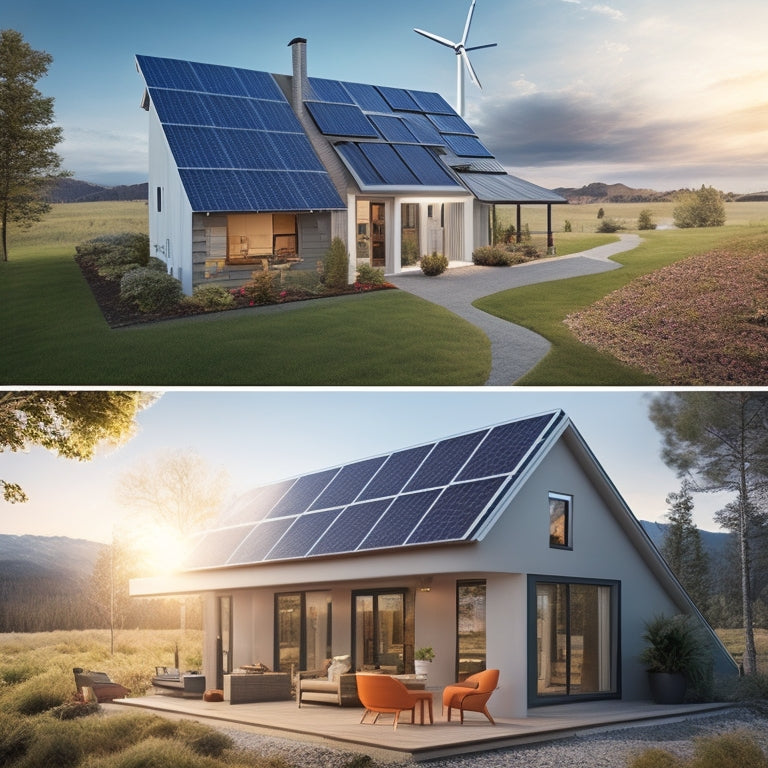
What's Better: Grid-Tied or Off-Grid Battery Storage?
Share
You're assessing the pros and cons of grid-tied and off-grid battery storage systems. Grid-tied systems offer lower installation costs, reliability, and lower maintenance, but they may lead to higher long-term bills. Off-grid systems provide energy independence, customizable designs, and sustainability, but come with higher initial costs and potential higher maintenance costs. Your decision ultimately depends on your energy needs, budget, and desired level of independence. As you consider these factors, you'll want to investigate the subtleties of each system, and their implications for your specific situation, to make an informed decision.
Key Takeaways
- Grid-tied systems offer lower installation costs and maintenance, but may lead to higher long-term bills and require regular maintenance for peak efficiency.
- Off-grid systems provide complete autonomy from utility companies, but come with higher initial costs and larger upfront investments in renewable energy sources.
- Consider energy independence needs: off-grid systems are ideal for areas with unreliable grid access, while grid-tied systems are better for those with reliable grid connections.
- Evaluate energy demand and storage needs: off-grid systems require larger battery banks, while grid-tied systems can utilize solar energy without battery storage.
- Assess financial goals: grid-tied systems often provide quicker ROI through net metering, while off-grid systems may offer long-term savings potential through reduced energy costs.
Grid-Tied Systems: Pros and Cons
How do you benefit from grid-tied systems, and what're the trade-offs?
You'll enjoy the reliability of a grid-tied system, which allows you to draw energy from the grid when your batteries are depleted. Installation complexity is relatively low, and maintenance requirements are minimal.
Additionally, grid-tied systems have a lower environmental impact due to the ability to sell excess energy back to the grid, much like solar-powered EV charging which reduces grid reliance and carbon footprint for EV charging stations.
Regular maintenance, including cleaning, is essential for peak energy production and efficiency. Technology advancements have made these systems more efficient, and scalability options are available to accommodate your growing energy needs.
However, you'll need to take into account the potential for grid outages and the initial investment required.
Off-Grid Systems: Advantages and Disadvantages
When you opt for an off-grid system, you're taking control of your energy needs, ensuring you're not reliant on the grid.
This means you'll enjoy energy independence, which is critical in areas with frequent outages or for those who want to live off the land.
Energy Independence Matters
What does it mean to have true energy independence? It means you're not reliant on the grid, and you're in control of your power.
With off-grid battery storage, you can utilize renewable resources like solar or wind to generate electricity, giving you power autonomy. This self-sufficiency strategy aligns with your sustainability goals, reducing your environmental impact.
Additionally, investment in renewable energy for charging stations reduces operational costs and enhances property value via tax incentives Government Incentives.
Thanks to technology advancements, off-grid systems are now more efficient and cost-effective. You're also contributing to community initiatives that promote energy resilience.
No Utility Bills
Living off the grid means eliminating your reliance on utility bills, a luxury that comes with its set of advantages and disadvantages.
You'll enjoy utility savings, as you're no longer tied to the grid and its fluctuating rates. Additionally, having sustainable road trip amenities nearby can be a plus, providing you with convenient and eco-friendly options for your energy needs.
Off-grid systems allow you to optimize your energy efficiency, reducing your overall energy consumption. This independence comes with the freedom to manage your energy usage, making you less reliant on external power sources.
However, you'll need to evaluate the initial investment in equipment and maintenance costs, as well as the potential for energy storage limitations during periods of low energy production.
Understanding Net Metering Benefits
You'll want to understand how net metering benefits your grid-tied system, as it can greatly reduce your energy costs.
By generating your own electricity and exporting any excess to the grid, you'll offset your energy consumption and lower your utility bills.
Implementing net metering incentives can also reduce demand charges and shift non-essential loads to off-peak hours, further enhancing the benefits.
As you increase your energy independence, you'll also reduce your reliance on the grid, providing you with more control over your energy usage.
Reducing Energy Costs
You can optimize your energy management by consuming stored energy during peak hours, reducing your reliance on utility rates.
By implementing an optimized solar panel array design, you can enhance energy production and maximize your solar incentives.
Solar incentives and net metering benefits can be combined to maximize your financial planning and investment returns.
By monitoring your consumption habits, you can adjust your energy usage to minimize waste and reduce system maintenance needs.
With grid-tied battery storage, you're in control of your energy costs, making it easier to achieve long-term financial freedom.
Increasing Energy Independence
With the rise of renewable energy, homeowners and businesses are embracing energy independence, and net metering benefits play an essential role in achieving this goal. You can enjoy energy security by generating your own power and reducing reliance on the grid. Net metering allows you to feed excess energy back into the grid and offset your consumption during periods of low energy production.
| Benefits | Grid-Tied | Off-Grid |
|---|---|---|
| Energy Security | ||
| Renewable Sources | ||
| Sustainable Living | ||
| Technological Advancements |
Energy Independence With Off-Grid
Breaking free from the grid's constraints, off-grid battery storage enables you to employ renewable energy and achieve true energy independence.
You'll no longer be tied to the grid's schedule, rates, or outages. With off-grid energy storage, you can capture renewable resources like solar or wind power to generate electricity.
This setup allows you to live an off-grid lifestyle, where self-sufficiency and sustainable living become a reality.
-
You'll enjoy increased energy security, as you're no longer reliant on the grid for power.
-
Off-grid systems typically have lower maintenance requirements, reducing the need for frequent upkeep.
-
By leveraging renewable energy, you'll minimize your environmental impact and contribute to a cleaner future.
- With proper care, your off-grid battery storage system can last for decades, ensuring long-term energy autonomy.
Grid-Tied Systems for Backup Power
You can employ the benefits of renewable energy while still maintaining a connection to the grid with grid-tied systems, which provide backup power during outages.
In a grid-tied system, your solar panels or wind turbine generates electricity and feeds it into the grid. When the grid goes down, the system automatically switches to backup mode, powering your essential appliances.
This setup offers high system reliability, as you can still draw power from the grid when your renewable energy source isn't producing.
However, installation complexity is higher due to the need for specialized equipment and permits. Additionally, you'll need to verify your system meets the grid's technical requirements.
Cost Comparison: Grid-Tied Vs Off-Grid
The cost of grid-tied and off-grid battery storage systems varies considerably, depending on your energy needs and preferences.
When considering the initial investment, you'll find that off-grid systems typically require a larger upfront cost due to the need for additional components, such as charge controllers and inverters.
However, this higher initial investment can lead to long term savings through reduced reliance on the grid.
- Off-grid systems often require a larger initial investment due to additional components
- Grid-tied systems may have lower upfront costs, but can lead to higher electricity bills in the long run
- Off-grid systems can provide long term savings through reduced grid reliance
- Grid-tied systems may require more maintenance and monitoring to guarantee peak performance
Frequently Asked Questions
Can I Mix Grid-Tied and Off-Grid Systems in One Setup?
You can create a hybrid system that combines grid-tied and off-grid capabilities, allowing you to utilize energy independence while still benefiting from the grid when needed, offering the best of both worlds.
Do Off-Grid Systems Require More Maintenance Than Grid-Tied Ones?
You'll practically be a full-time battery caretaker with off-grid systems, which require far more careful maintenance to guarantee system reliability, resulting in considerably higher maintenance costs that'll eat into your hard-won freedom.
Are There Any Government Incentives for Off-Grid Battery Storage?
You'll find government rebates and tax credits for off-grid battery storage, promoting energy independence and system reliability while reducing installation costs and environmental impact, as you take control of your power and break free from the grid.
Can I Use My Existing Electrical Panel With a Battery Storage System?
You'll need to assess your electrical panel's compatibility with a battery storage system; if it's not designed for integration, you may require a new panel or upgrades to guarantee safe, efficient battery storage integration and ideal system performance.
How Do I Choose the Right Battery Type for My Energy Needs?
You consider a case like Tesla's Powerwall, where lithium-ion batteries provide 13.5 kWh of energy storage, leveraging lithium's advantages in high cycle life and efficiency. Now, you weigh options, factoring in lead acid's drawbacks, like limited lifespan and bulkiness, to choose the best fit for your energy needs.
Related Posts
-

What Cool Roof Tax Breaks Can Homeowners Claim?
You can claim federal tax credits of up to $500 and state and local incentives for installing cool roofs, which not o...
-

Why Merge Earth's Heat With Sun's Energy?
You're about to utilize the full potential of renewable energy by combining the Earth's natural heat with the Sun's a...
-

10 Powerful Electric Mowers for Expansive Lawns
You're moving away from gas-powered mowers and exploring electric options for your expansive lawn. You'll find that h...


